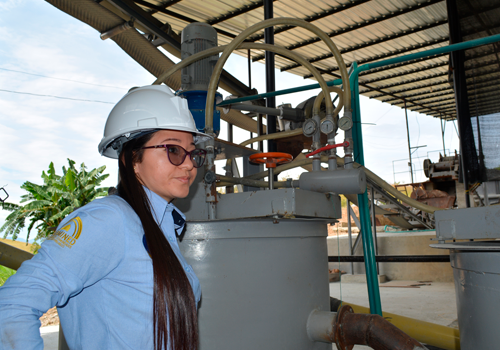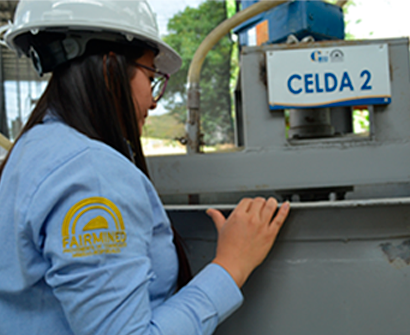Community Stories
Nidia Pérez: A story of women’s empowerment in artisanal and small-scale mining

Nidia Pérez is an associate partner and operations coordinator at Cooperativa Agrominera de Íquira in Huila, Colombia. We spoke with her about her history, life as a mining partner, and insights into artisanal and small-scale mining in Colombia and the region.
The Íquira mining organization received the Fairmined certification again for six years in a row in 2021. On the occasion of this important milestone, we visited Pacarní, a town in Huila, Colombia, and talked with Nidia, a chemical engineer working as an operations coordinator at this mining organization, about the positive impact that the Fairmined certification has brought to the region as well as all joint work she has made with her coworkers to extract gold in a clean and responsible way.
What were the beginnings of mining in the region like? What was life like in the community when these mines first appeared before becoming formal?
My family is from the countryside, we made our first tunnel in the backyard of my parents’ farm. My dad always did everything by intuition and we dug the tunnel at night with my brothers and sisters.
That is how mining began in the region, in a very rudimentary way, using picks, shovels and boats. As matter of fact, it was not customary to timber frame the tunnel or take into account safety measures. There was only one tunnel with room for one person, without any support structures, where the owner of the mine and his children or siblings only worked there. There were many risks and accidents due to the use of explosives and inhalation of toxic gases.

Later, they began inquiring into the matter so my dad and other local people began to refine their techniques and identify mineral veins and traces. Some years later, after getting certified, the community itself changed as gold mining brought many benefits. In the past, people lived on a low income, their economy basically depended on agriculture and informal work. When gold production became responsible, the town grew almost as a municipality, people started their own businesses opening restaurants, building healthcare centers, offering welfare services, etc., things that we did not use to have before.
Why do think the Fairmined initiative was so easily adopted by local miners in Pacarní and Íquira?
Our miners in the region have always wanted to organize themselves better, that is, we always think about those things that will benefit all of our people, and in the same way we carry out farming activities, we aim to mine without harming the environment while complying with Fairmined requirements. We have easily carried out this task so far. Our huge advantage is that we have this mindset of looking out for the interests of others, which has helped us join the initiative and be able to be audited. Improvements made at the beginning, such as substituting harmful chemicals for other chemicals, were possible thanks to Fairmined. That is something of which we are very proud of.
MINING WOMEN
How do you feel about being a woman in a male-dominated industry having a decision-making position? What are your priorities in your daily life?
For me, being a woman miner is something I am proud of. I love my job! Although our (female) participation is not very high in this sector, I work in the processing plant, feeling always supported by my family and the company.
In my house, we were six siblings, four of which had to work early to provide for our family. When I was old enough to go to school, my older brothers gave me and my younger brother the opportunity to go to college, they paid for it. I went for chemical and environmental engineering. After seeing the efforts that my parents and siblings made to pay for college in the city, I thought of giving back to my family once I graduated. My parents and brothers did not go to school, they are artisanal miners that do not have a business approach, so after my arrival, we created a work team with my dad and brothers and I became responsible for mine management and mineral processing.

I have trained myself to have a thorough understanding of processes, I feel very proud to contribute to my family and lead this process as a woman.
My priority is to supervise that each process works, take care of every detail to prevent waste and ensure efficiency to fulfill our commitments to our employees.
What do you consider to be the most important challenges facing artisanal and small-scale mining organizations in Colombia for both certified and non-certified organizations?
When it comes to mining in Colombia, there are many aspects to improve as well as many problems to solve, which depend on the mining area in question. In our area, our biggest challenge is to keep the Fairmined certification and improve our processes to keep being pioneers and being considered a model for other mines.
Our second challenge is to maintain ourselves as an organization in difficult times like when gold prices dropped in 2020 and part of 2021 due to the pandemic. And that is what we are aiming for, to develop strategies to maintain our profitability in adverse times.
What message would you send to the world’s gold consumers?
I would make them an invitation to inquire about gold extraction and learn more about clean and responsible mining. That there are organizations like ours that carry out processes without harming the environment by controlling every step of gold processing. I invite them to come and learn more about our work. Thank you for sharing this space with us. It was a great joy for me!
